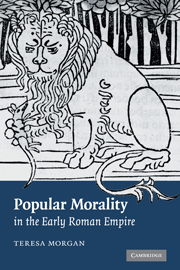Book contents
- Frontmatter
- Contents
- Preface
- List of illustrations
- List of tables
- List of abbreviations
- 1 Introduction
- PART ONE
- PART TWO
- PART THREE
- Conclusion
- Appendix 1 The political and literary connections of Babrius
- Appendix 2 The definition of a miscellany
- Appendix 3 Popular morality and philosophical doctrine
- List of papyri
- Bibliography
- Index
1 - Introduction
Published online by Cambridge University Press: 27 October 2009
- Frontmatter
- Contents
- Preface
- List of illustrations
- List of tables
- List of abbreviations
- 1 Introduction
- PART ONE
- PART TWO
- PART THREE
- Conclusion
- Appendix 1 The political and literary connections of Babrius
- Appendix 2 The definition of a miscellany
- Appendix 3 Popular morality and philosophical doctrine
- List of papyri
- Bibliography
- Index
Summary
How should we live? What kind of people should we be? What is it good or bad, necessary or right, sweet, absurd or impossible to do? Who decides for us, and on what grounds? These are fundamental human questions, and few people or societies pass a day without asking them. For a historian or an anthropologist, the question is framed in slightly different terms: what role does morality play in helping any group of people to create or maintain a society?
This book takes as its premise that morality matters. Like political, social and economic behaviour, moral behaviour is endemic in human societies. Like them, it helps groups to organize themselves, to negotiate their inevitable differences and to survive. Like them, it has a grammar, a structure, which is as distinctive of the group as is its language or religion. Unlike them, however, it is often overlooked as a constituent of history.
The focus of this study is what I shall call the popular morality of the Roman Empire in, roughly, the first two centuries of the common era. The early Empire has a number of attractions for a historian of ethics. More of the Greek and Roman world was then united (at least nominally) under one ruler than at any other time, giving us a vast field in which to work while remaining within the boundaries of one state.
- Type
- Chapter
- Information
- Popular Morality in the Early Roman Empire , pp. 1 - 22Publisher: Cambridge University PressPrint publication year: 2007



